Career and Lifestyle Development: Theory Application and Synthesis
VerifiedAdded on 2022/09/15
|8
|1416
|11
Essay
AI Summary
This essay explores the application of the Social Cognitive Career Theory (SCCT) to career and lifestyle development. It begins with an introduction to career development theories, emphasizing their importance in guiding professional growth and career satisfaction. The essay then delves into the specifics of SCCT, detailing its three interconnected aspects: the development of academic and career interests, career and educational choices, and achieving career and academic success. The discussion covers key concepts such as self-efficacy, result expectancy, and personal goals, highlighting the theory's strengths, including its emphasis on self-efficacy and its application to diverse populations. The essay also acknowledges the theory's weaknesses, such as its potential for cognitive defects and its limitations in providing specific career choices. The synthesis section reflects on the theory's role in setting vocational goals and the importance of job satisfaction. It considers the integration of cognitive, behavioral, and demonstrative representations of performance modification, and concludes by suggesting the potential benefits of Holland's theory for further vocational development, while also acknowledging the increasing importance of behavioral therapy. The essay concludes by summarizing the importance of career development theory and offering insights into how it can be used to achieve career goals.
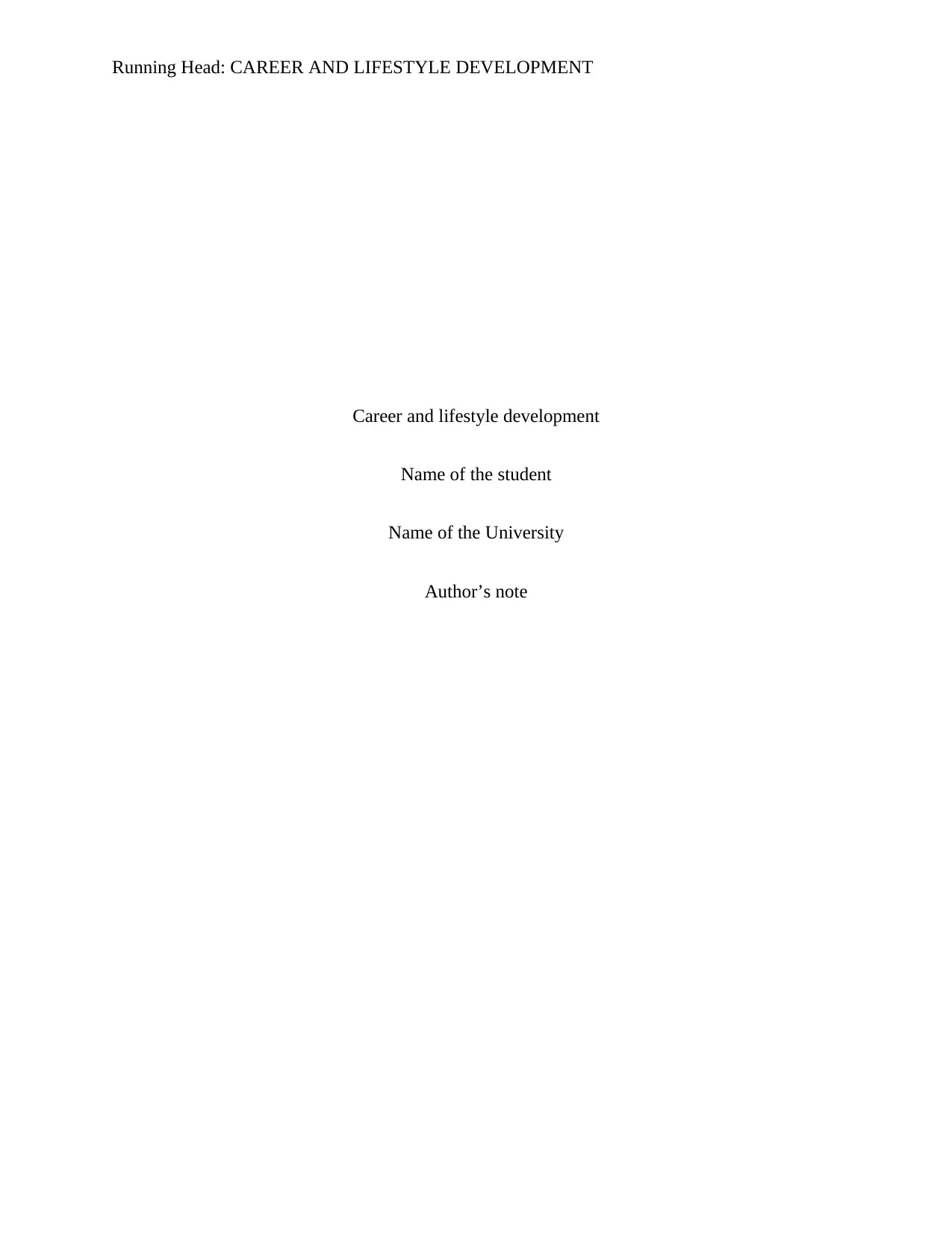
Running Head: CAREER AND LIFESTYLE DEVELOPMENT
Career and lifestyle development
Name of the student
Name of the University
Author’s note
Career and lifestyle development
Name of the student
Name of the University
Author’s note
Paraphrase This Document
Need a fresh take? Get an instant paraphrase of this document with our AI Paraphraser
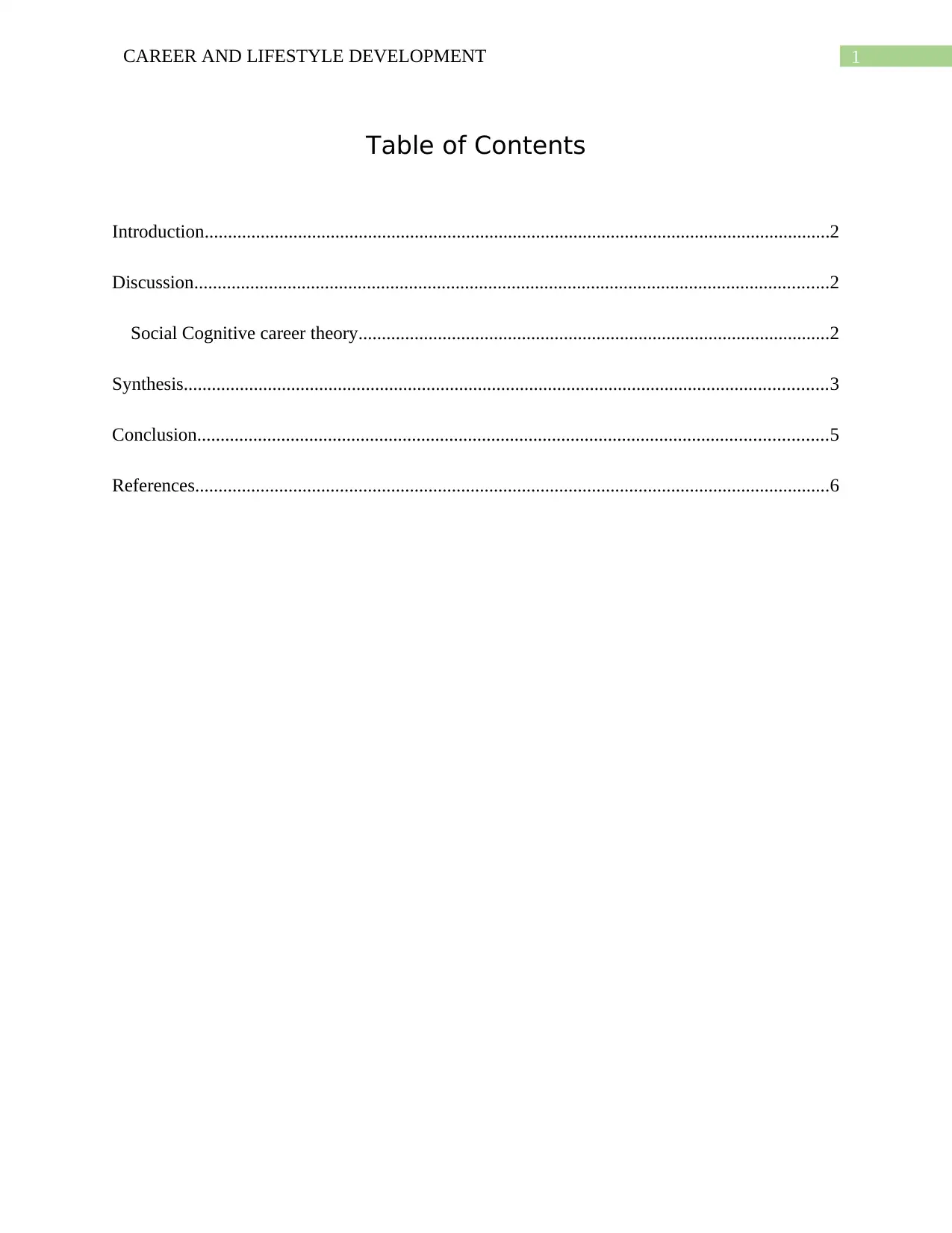
1CAREER AND LIFESTYLE DEVELOPMENT
Table of Contents
Introduction......................................................................................................................................2
Discussion........................................................................................................................................2
Social Cognitive career theory.....................................................................................................2
Synthesis..........................................................................................................................................3
Conclusion.......................................................................................................................................5
References........................................................................................................................................6
Table of Contents
Introduction......................................................................................................................................2
Discussion........................................................................................................................................2
Social Cognitive career theory.....................................................................................................2
Synthesis..........................................................................................................................................3
Conclusion.......................................................................................................................................5
References........................................................................................................................................6
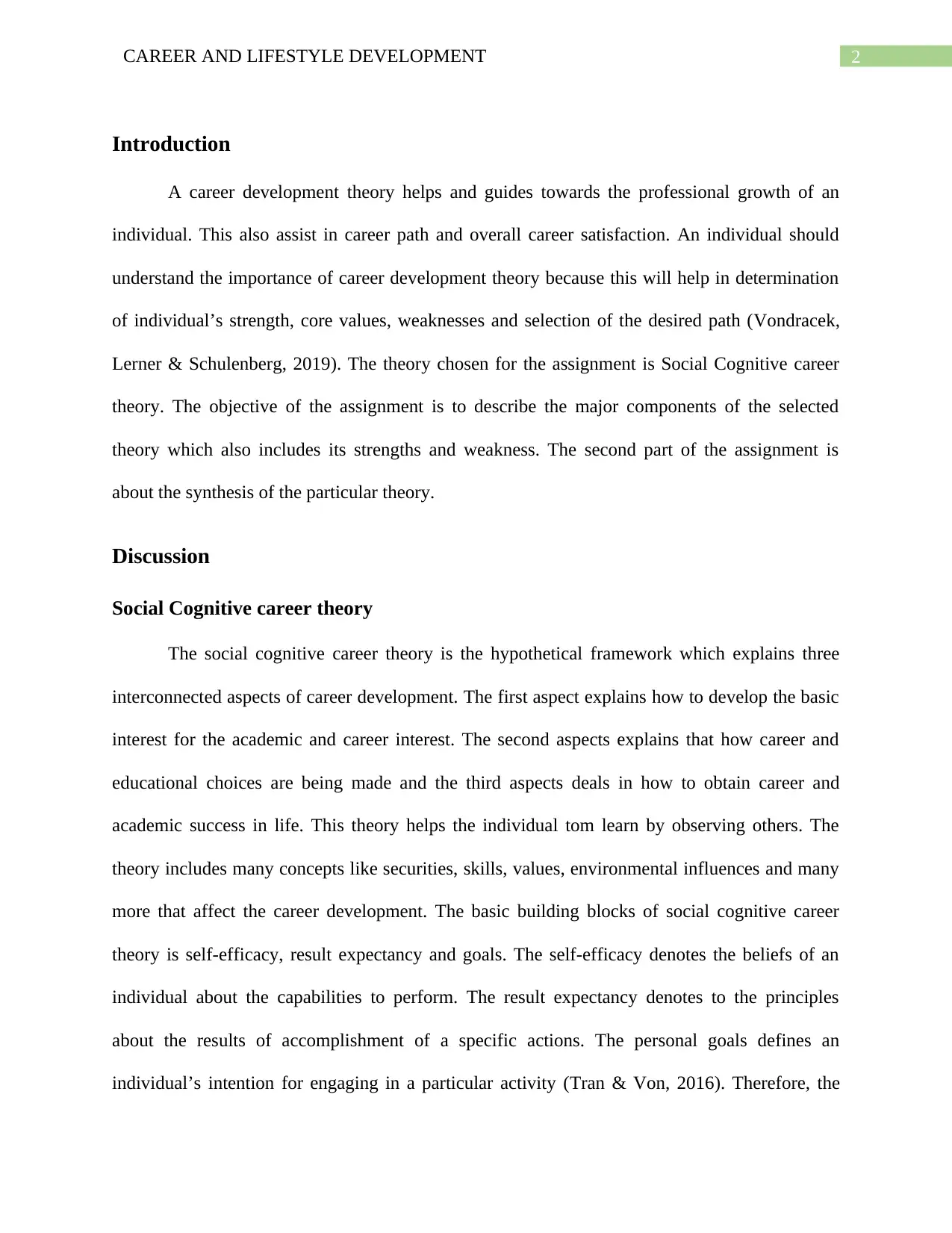
2CAREER AND LIFESTYLE DEVELOPMENT
Introduction
A career development theory helps and guides towards the professional growth of an
individual. This also assist in career path and overall career satisfaction. An individual should
understand the importance of career development theory because this will help in determination
of individual’s strength, core values, weaknesses and selection of the desired path (Vondracek,
Lerner & Schulenberg, 2019). The theory chosen for the assignment is Social Cognitive career
theory. The objective of the assignment is to describe the major components of the selected
theory which also includes its strengths and weakness. The second part of the assignment is
about the synthesis of the particular theory.
Discussion
Social Cognitive career theory
The social cognitive career theory is the hypothetical framework which explains three
interconnected aspects of career development. The first aspect explains how to develop the basic
interest for the academic and career interest. The second aspects explains that how career and
educational choices are being made and the third aspects deals in how to obtain career and
academic success in life. This theory helps the individual tom learn by observing others. The
theory includes many concepts like securities, skills, values, environmental influences and many
more that affect the career development. The basic building blocks of social cognitive career
theory is self-efficacy, result expectancy and goals. The self-efficacy denotes the beliefs of an
individual about the capabilities to perform. The result expectancy denotes to the principles
about the results of accomplishment of a specific actions. The personal goals defines an
individual’s intention for engaging in a particular activity (Tran & Von, 2016). Therefore, the
Introduction
A career development theory helps and guides towards the professional growth of an
individual. This also assist in career path and overall career satisfaction. An individual should
understand the importance of career development theory because this will help in determination
of individual’s strength, core values, weaknesses and selection of the desired path (Vondracek,
Lerner & Schulenberg, 2019). The theory chosen for the assignment is Social Cognitive career
theory. The objective of the assignment is to describe the major components of the selected
theory which also includes its strengths and weakness. The second part of the assignment is
about the synthesis of the particular theory.
Discussion
Social Cognitive career theory
The social cognitive career theory is the hypothetical framework which explains three
interconnected aspects of career development. The first aspect explains how to develop the basic
interest for the academic and career interest. The second aspects explains that how career and
educational choices are being made and the third aspects deals in how to obtain career and
academic success in life. This theory helps the individual tom learn by observing others. The
theory includes many concepts like securities, skills, values, environmental influences and many
more that affect the career development. The basic building blocks of social cognitive career
theory is self-efficacy, result expectancy and goals. The self-efficacy denotes the beliefs of an
individual about the capabilities to perform. The result expectancy denotes to the principles
about the results of accomplishment of a specific actions. The personal goals defines an
individual’s intention for engaging in a particular activity (Tran & Von, 2016). Therefore, the
⊘ This is a preview!⊘
Do you want full access?
Subscribe today to unlock all pages.

Trusted by 1+ million students worldwide
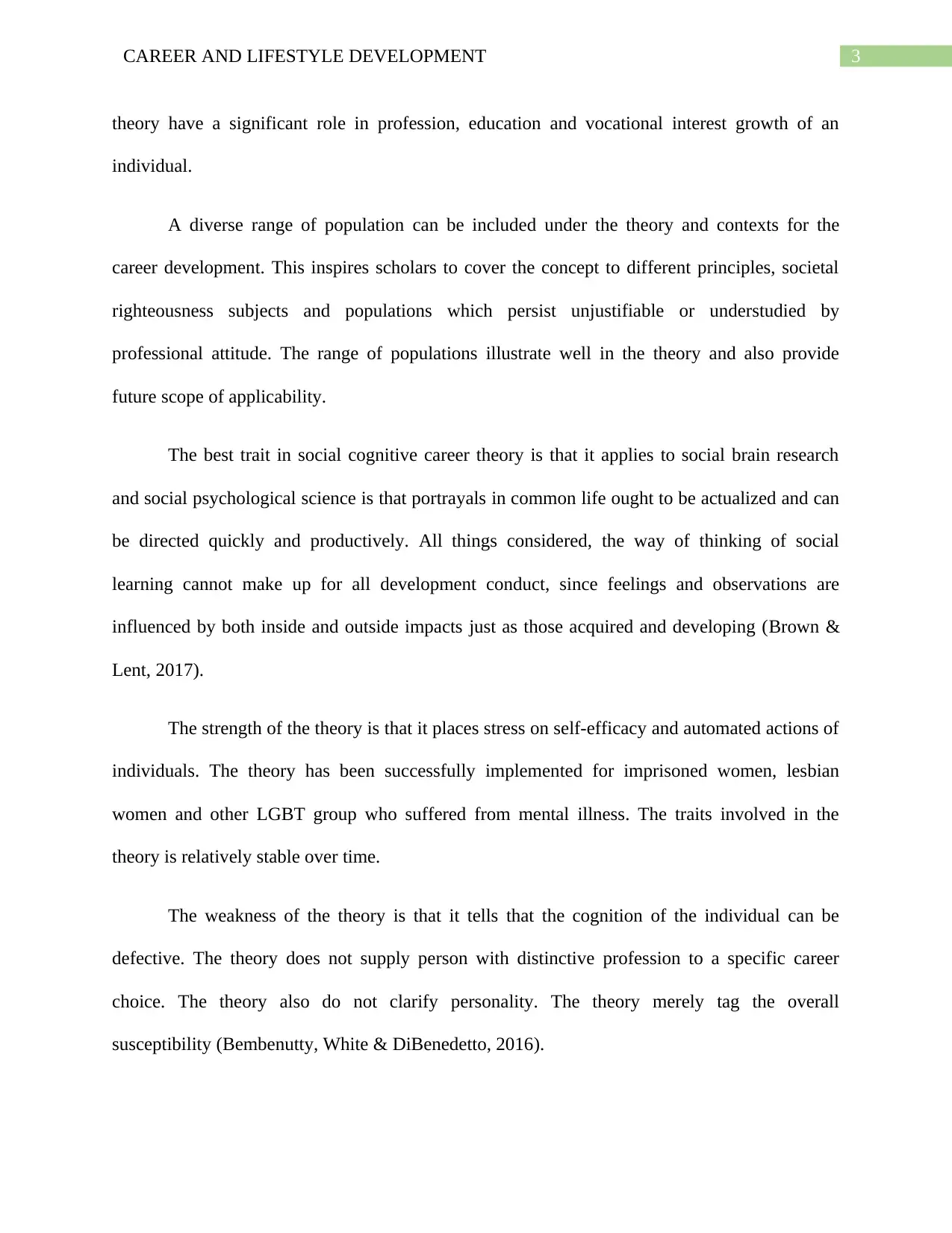
3CAREER AND LIFESTYLE DEVELOPMENT
theory have a significant role in profession, education and vocational interest growth of an
individual.
A diverse range of population can be included under the theory and contexts for the
career development. This inspires scholars to cover the concept to different principles, societal
righteousness subjects and populations which persist unjustifiable or understudied by
professional attitude. The range of populations illustrate well in the theory and also provide
future scope of applicability.
The best trait in social cognitive career theory is that it applies to social brain research
and social psychological science is that portrayals in common life ought to be actualized and can
be directed quickly and productively. All things considered, the way of thinking of social
learning cannot make up for all development conduct, since feelings and observations are
influenced by both inside and outside impacts just as those acquired and developing (Brown &
Lent, 2017).
The strength of the theory is that it places stress on self-efficacy and automated actions of
individuals. The theory has been successfully implemented for imprisoned women, lesbian
women and other LGBT group who suffered from mental illness. The traits involved in the
theory is relatively stable over time.
The weakness of the theory is that it tells that the cognition of the individual can be
defective. The theory does not supply person with distinctive profession to a specific career
choice. The theory also do not clarify personality. The theory merely tag the overall
susceptibility (Bembenutty, White & DiBenedetto, 2016).
theory have a significant role in profession, education and vocational interest growth of an
individual.
A diverse range of population can be included under the theory and contexts for the
career development. This inspires scholars to cover the concept to different principles, societal
righteousness subjects and populations which persist unjustifiable or understudied by
professional attitude. The range of populations illustrate well in the theory and also provide
future scope of applicability.
The best trait in social cognitive career theory is that it applies to social brain research
and social psychological science is that portrayals in common life ought to be actualized and can
be directed quickly and productively. All things considered, the way of thinking of social
learning cannot make up for all development conduct, since feelings and observations are
influenced by both inside and outside impacts just as those acquired and developing (Brown &
Lent, 2017).
The strength of the theory is that it places stress on self-efficacy and automated actions of
individuals. The theory has been successfully implemented for imprisoned women, lesbian
women and other LGBT group who suffered from mental illness. The traits involved in the
theory is relatively stable over time.
The weakness of the theory is that it tells that the cognition of the individual can be
defective. The theory does not supply person with distinctive profession to a specific career
choice. The theory also do not clarify personality. The theory merely tag the overall
susceptibility (Bembenutty, White & DiBenedetto, 2016).
Paraphrase This Document
Need a fresh take? Get an instant paraphrase of this document with our AI Paraphraser
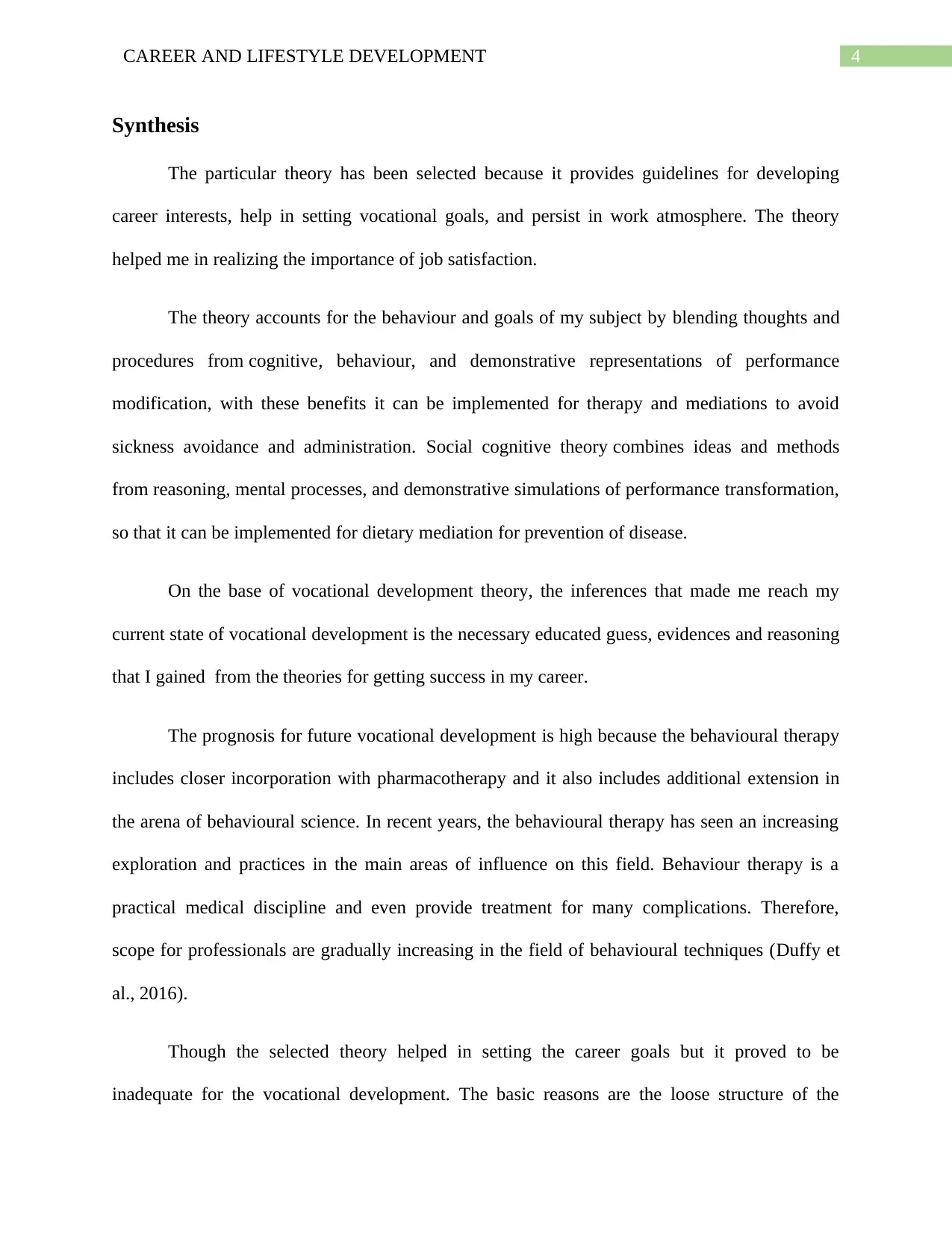
4CAREER AND LIFESTYLE DEVELOPMENT
Synthesis
The particular theory has been selected because it provides guidelines for developing
career interests, help in setting vocational goals, and persist in work atmosphere. The theory
helped me in realizing the importance of job satisfaction.
The theory accounts for the behaviour and goals of my subject by blending thoughts and
procedures from cognitive, behaviour, and demonstrative representations of performance
modification, with these benefits it can be implemented for therapy and mediations to avoid
sickness avoidance and administration. Social cognitive theory combines ideas and methods
from reasoning, mental processes, and demonstrative simulations of performance transformation,
so that it can be implemented for dietary mediation for prevention of disease.
On the base of vocational development theory, the inferences that made me reach my
current state of vocational development is the necessary educated guess, evidences and reasoning
that I gained from the theories for getting success in my career.
The prognosis for future vocational development is high because the behavioural therapy
includes closer incorporation with pharmacotherapy and it also includes additional extension in
the arena of behavioural science. In recent years, the behavioural therapy has seen an increasing
exploration and practices in the main areas of influence on this field. Behaviour therapy is a
practical medical discipline and even provide treatment for many complications. Therefore,
scope for professionals are gradually increasing in the field of behavioural techniques (Duffy et
al., 2016).
Though the selected theory helped in setting the career goals but it proved to be
inadequate for the vocational development. The basic reasons are the loose structure of the
Synthesis
The particular theory has been selected because it provides guidelines for developing
career interests, help in setting vocational goals, and persist in work atmosphere. The theory
helped me in realizing the importance of job satisfaction.
The theory accounts for the behaviour and goals of my subject by blending thoughts and
procedures from cognitive, behaviour, and demonstrative representations of performance
modification, with these benefits it can be implemented for therapy and mediations to avoid
sickness avoidance and administration. Social cognitive theory combines ideas and methods
from reasoning, mental processes, and demonstrative simulations of performance transformation,
so that it can be implemented for dietary mediation for prevention of disease.
On the base of vocational development theory, the inferences that made me reach my
current state of vocational development is the necessary educated guess, evidences and reasoning
that I gained from the theories for getting success in my career.
The prognosis for future vocational development is high because the behavioural therapy
includes closer incorporation with pharmacotherapy and it also includes additional extension in
the arena of behavioural science. In recent years, the behavioural therapy has seen an increasing
exploration and practices in the main areas of influence on this field. Behaviour therapy is a
practical medical discipline and even provide treatment for many complications. Therefore,
scope for professionals are gradually increasing in the field of behavioural techniques (Duffy et
al., 2016).
Though the selected theory helped in setting the career goals but it proved to be
inadequate for the vocational development. The basic reasons are the loose structure of the
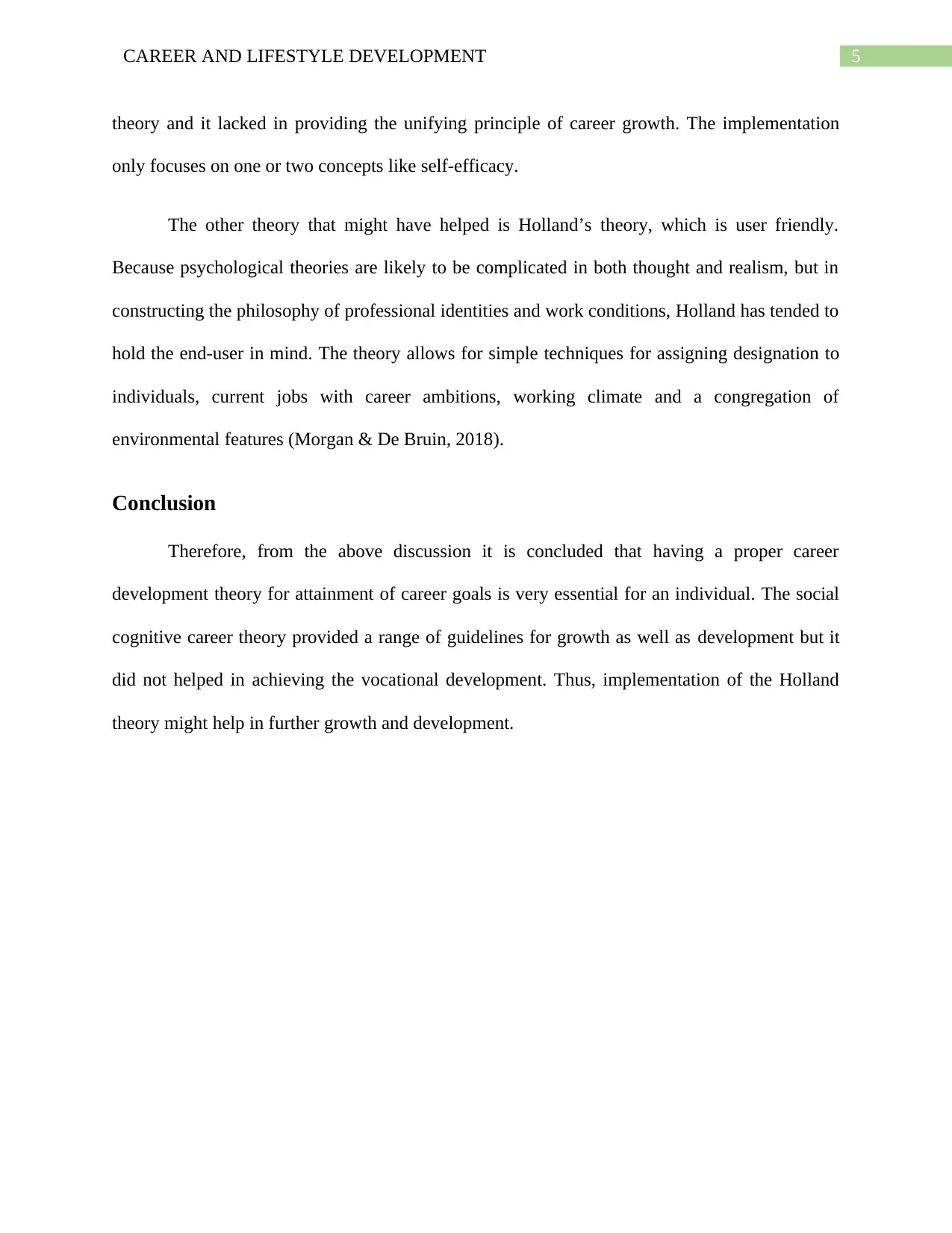
5CAREER AND LIFESTYLE DEVELOPMENT
theory and it lacked in providing the unifying principle of career growth. The implementation
only focuses on one or two concepts like self-efficacy.
The other theory that might have helped is Holland’s theory, which is user friendly.
Because psychological theories are likely to be complicated in both thought and realism, but in
constructing the philosophy of professional identities and work conditions, Holland has tended to
hold the end-user in mind. The theory allows for simple techniques for assigning designation to
individuals, current jobs with career ambitions, working climate and a congregation of
environmental features (Morgan & De Bruin, 2018).
Conclusion
Therefore, from the above discussion it is concluded that having a proper career
development theory for attainment of career goals is very essential for an individual. The social
cognitive career theory provided a range of guidelines for growth as well as development but it
did not helped in achieving the vocational development. Thus, implementation of the Holland
theory might help in further growth and development.
theory and it lacked in providing the unifying principle of career growth. The implementation
only focuses on one or two concepts like self-efficacy.
The other theory that might have helped is Holland’s theory, which is user friendly.
Because psychological theories are likely to be complicated in both thought and realism, but in
constructing the philosophy of professional identities and work conditions, Holland has tended to
hold the end-user in mind. The theory allows for simple techniques for assigning designation to
individuals, current jobs with career ambitions, working climate and a congregation of
environmental features (Morgan & De Bruin, 2018).
Conclusion
Therefore, from the above discussion it is concluded that having a proper career
development theory for attainment of career goals is very essential for an individual. The social
cognitive career theory provided a range of guidelines for growth as well as development but it
did not helped in achieving the vocational development. Thus, implementation of the Holland
theory might help in further growth and development.
⊘ This is a preview!⊘
Do you want full access?
Subscribe today to unlock all pages.

Trusted by 1+ million students worldwide
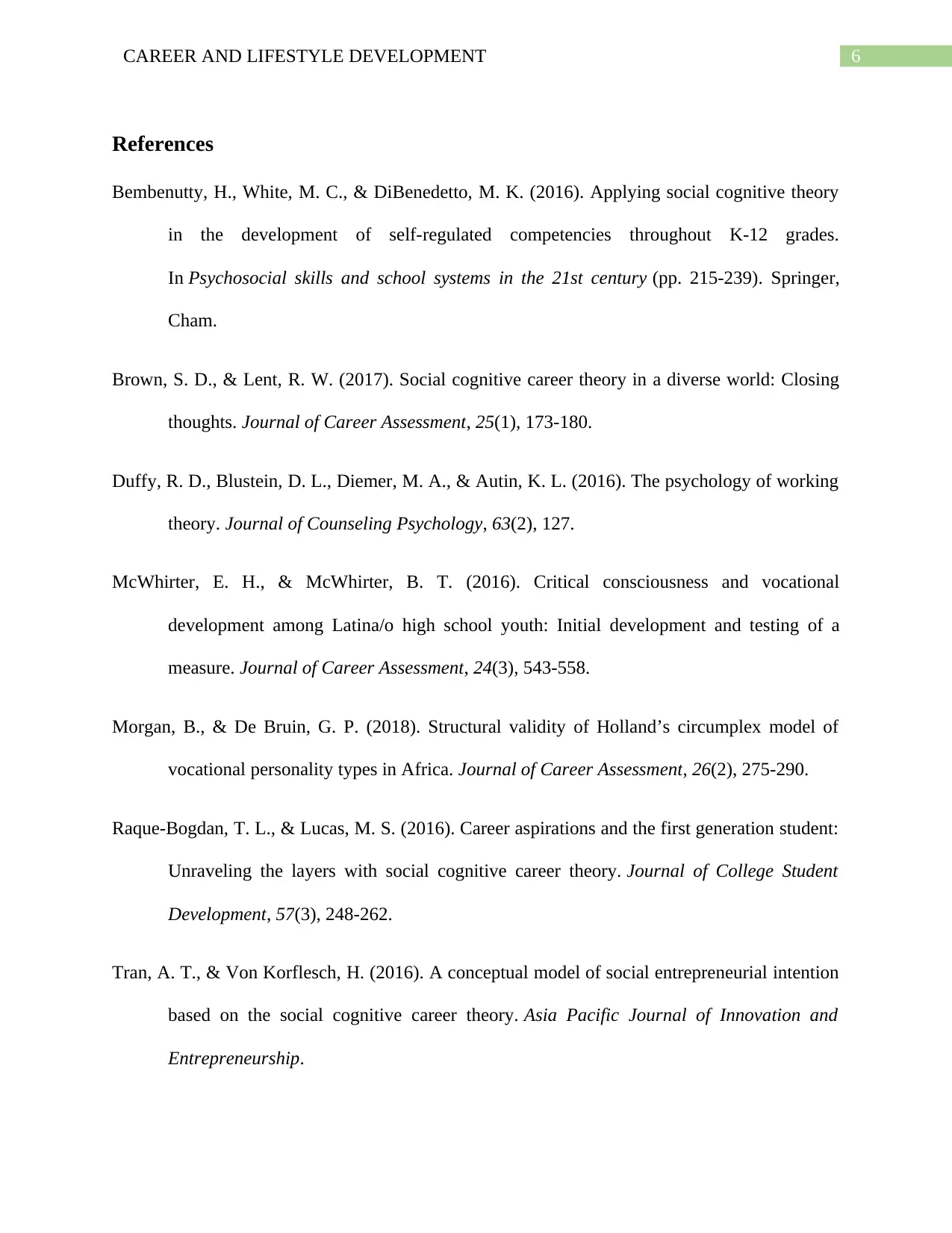
6CAREER AND LIFESTYLE DEVELOPMENT
References
Bembenutty, H., White, M. C., & DiBenedetto, M. K. (2016). Applying social cognitive theory
in the development of self-regulated competencies throughout K-12 grades.
In Psychosocial skills and school systems in the 21st century (pp. 215-239). Springer,
Cham.
Brown, S. D., & Lent, R. W. (2017). Social cognitive career theory in a diverse world: Closing
thoughts. Journal of Career Assessment, 25(1), 173-180.
Duffy, R. D., Blustein, D. L., Diemer, M. A., & Autin, K. L. (2016). The psychology of working
theory. Journal of Counseling Psychology, 63(2), 127.
McWhirter, E. H., & McWhirter, B. T. (2016). Critical consciousness and vocational
development among Latina/o high school youth: Initial development and testing of a
measure. Journal of Career Assessment, 24(3), 543-558.
Morgan, B., & De Bruin, G. P. (2018). Structural validity of Holland’s circumplex model of
vocational personality types in Africa. Journal of Career Assessment, 26(2), 275-290.
Raque-Bogdan, T. L., & Lucas, M. S. (2016). Career aspirations and the first generation student:
Unraveling the layers with social cognitive career theory. Journal of College Student
Development, 57(3), 248-262.
Tran, A. T., & Von Korflesch, H. (2016). A conceptual model of social entrepreneurial intention
based on the social cognitive career theory. Asia Pacific Journal of Innovation and
Entrepreneurship.
References
Bembenutty, H., White, M. C., & DiBenedetto, M. K. (2016). Applying social cognitive theory
in the development of self-regulated competencies throughout K-12 grades.
In Psychosocial skills and school systems in the 21st century (pp. 215-239). Springer,
Cham.
Brown, S. D., & Lent, R. W. (2017). Social cognitive career theory in a diverse world: Closing
thoughts. Journal of Career Assessment, 25(1), 173-180.
Duffy, R. D., Blustein, D. L., Diemer, M. A., & Autin, K. L. (2016). The psychology of working
theory. Journal of Counseling Psychology, 63(2), 127.
McWhirter, E. H., & McWhirter, B. T. (2016). Critical consciousness and vocational
development among Latina/o high school youth: Initial development and testing of a
measure. Journal of Career Assessment, 24(3), 543-558.
Morgan, B., & De Bruin, G. P. (2018). Structural validity of Holland’s circumplex model of
vocational personality types in Africa. Journal of Career Assessment, 26(2), 275-290.
Raque-Bogdan, T. L., & Lucas, M. S. (2016). Career aspirations and the first generation student:
Unraveling the layers with social cognitive career theory. Journal of College Student
Development, 57(3), 248-262.
Tran, A. T., & Von Korflesch, H. (2016). A conceptual model of social entrepreneurial intention
based on the social cognitive career theory. Asia Pacific Journal of Innovation and
Entrepreneurship.
Paraphrase This Document
Need a fresh take? Get an instant paraphrase of this document with our AI Paraphraser
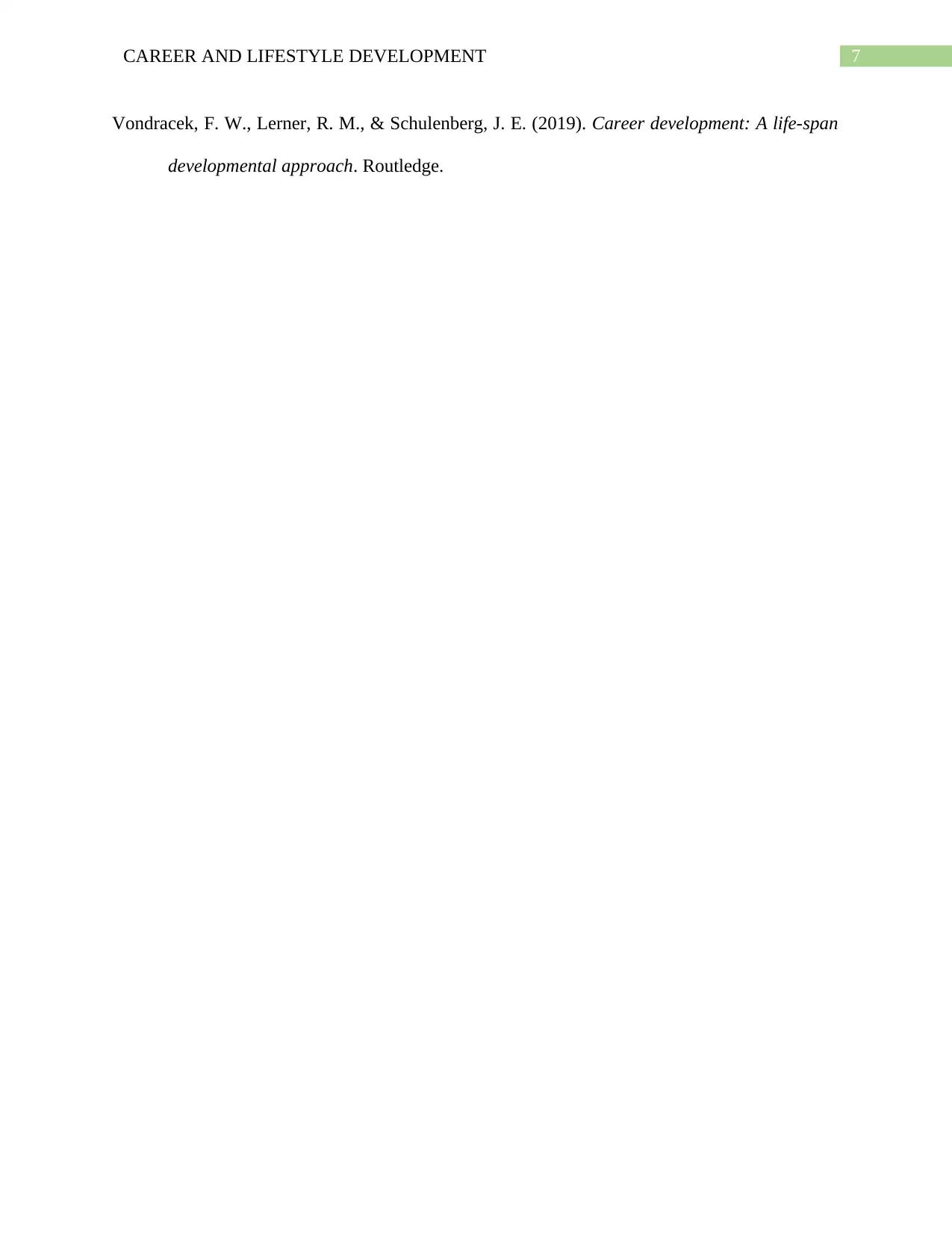
7CAREER AND LIFESTYLE DEVELOPMENT
Vondracek, F. W., Lerner, R. M., & Schulenberg, J. E. (2019). Career development: A life-span
developmental approach. Routledge.
Vondracek, F. W., Lerner, R. M., & Schulenberg, J. E. (2019). Career development: A life-span
developmental approach. Routledge.
1 out of 8
Related Documents
Your All-in-One AI-Powered Toolkit for Academic Success.
+13062052269
info@desklib.com
Available 24*7 on WhatsApp / Email
![[object Object]](/_next/static/media/star-bottom.7253800d.svg)
Unlock your academic potential
Copyright © 2020–2026 A2Z Services. All Rights Reserved. Developed and managed by ZUCOL.




